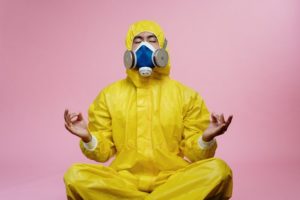Histamine – Friend or Foe?
Histamine is a part of the body’s inflammatory response. It can cause clots, allergic reactions, swelling, or fluid retention. It also causes vasodilation when we hurt ourselves. But have you ever wondered why all of this happens?
It’s because the body brings the immune cells to the site causing problems to speed up the recovery process and get the inflammation under control.
A lot of these mechanisms are acute punctuated mechanisms, which means they are on and then they go off involuntarily. But in the case of chronic inflammation in our system, be it in the gut or by way of other hormonal imbalances – the mechanism stays on. This chronic inflammation is not ideal for the body.
This could happen due to certain foods that we might be unknowingly allergic to or it can be triggered by a food item that we were not allergic to earlier, but we have suddenly started to experience a trigger reaction by the body. We result in chronic inflammation if the allergic reaction keeps taking place for a prolonged period. A classic sign of histamine intolerance.
Histamine and Its Function
Histamine is a chemical messenger and a mediator of the body’s responses. Histamine causes reactions in the body like:
- Gastrointestinal secretions
- Respiratory reactions
- Small Neurotransmitter reactions
- Inflammatory reactions
Histamine has also been shown to cause insomnia-like reactions and can cause a significant deterioration in the sleep-wake cycle.
The receptors responsible for receiving histamine are present in almost all parts of the body but are more significantly found in the blood vessels, gastrointestinal tract, lungs, and skin which makes these parts slightly more susceptible to high histamine foods.
Source of Histamine
Histamine is the part of our immune system and is produced when a foreign element enters our body. It is naturally present in the mast cells, but can also be introduced into our body through certain foods.
Every allergic reaction or inflammatory response that your body has gone through has been due to histamine.
The food allergies and intolerances that people have are commonly due to a histamine reaction happening in their digestive system, while allergies like sneezing, wheezing, and coughing are due to a response triggered by the lungs.
Histamine – Friend or Foe?

All these talks about histamine have led us to one question – is Histamine good or bad for us?
Sure, histamine has its positive attributes as well.it is a part of the immune system and the immune system is responsible for not letting any foreign particle infiltrate or damage our body.
Histamine is indeed needed by the body to produce certain brain reactions; helps secrete digestive enzymes and carry out other such mechanisms.
This is not a problem for people who have proper body functioning that helps flush out the excessive histamine from the body and cause no harm.
It becomes a problem when histamine gets accumulated in the body over time and starts causing unwanted reactions that turn chronic over time. This is also known as histamine intolerance.
What happens here is that the body becomes incapable of processing histamine due to the low production of certain enzymes and further leads to histamine intolerance.
Histamine intolerance could cause the following symptoms:
- Eczema
- Migraines
- Vertigo
- Headaches
- Hay fever
- Runny nose
- Eczema
- Hives
- Swelling of extremities
- Itching
- Digestive problems
- Anxiety
The primary cause for histamine intolerance is low immunity and secondary causes include poor gut health, medications, genetics, or excessive consumption of high histamine foods.
By this, we understand that histamine can be a friend as well as a foe. Although it works with our immune system and is needed by the body, excessive histamine in the body can be a part of some undesirable effects on the body.
Can You Avoid Histamine Intolerance?
Of course, you can!
Histamine intolerances can be avoided and cured with specific anti-histamine diets.
The food you eat greatly affects your body’s responses. Avoiding consumption of certain high histamine foods could help you lower your body’s allergic response and could help you get rid of your allergies altogether.
I have enlisted a few high histamine foods that you might be consuming in your diet and be unaware if and should start avoiding today itself.
1) Soy Sauce

Soy sauce is the root cause of asthma-like reactions in the body due to its effect on the nasal lining. It inflames the nasal lining and causes sneezing and wheezing.
2) Fermented Foods

Foods are fermented with the help of certain microorganisms that could trigger histamine response in the body.
Fermented foods like alcohol, cheese, yogurt, vinegar, etc. should be avoided in your diet.
Fermented food is great for gut health, but those suffering from allergies should avoid it temporarily.
3) Dried Fruits

No doubt dried fruits are very healthy and provide our body with adequate nutrition but what many people do not know is that they are very high in histamines.
Avoiding dried fruits to cure allergies can prove beneficial.
There are a few other foods that don’t necessarily contain histamine in them but do trigger the release of histamine in the body nonetheless.
These foods include:
- Tofu
- Milk and milk products
- Gluten
- Banana
- Olive and olive oils
- Tomatoes
- Dyed foods
- Smoked fish
- Certain nuts
Bottomline

The effect of these foods may differ from person to person. Not everyone could have the same symptoms and the same allergies.
A trial and error method to find out the root cause of your allergy can help or you could follow a low histamine diet as well.
If you think you have a serious issue, you could always get yourself tested for allergies by a professional through certain DOA enzyme tests or vitamin deficiency tests.
Also, make sure to get your medicines reviewed by a professional as well as they also are known to cause flare-ups in the body.
Histamine is needed in the body like any other chemical and should be present in a limited amount. Overdose of anything can cause reverse effects. The same is with histamine.

